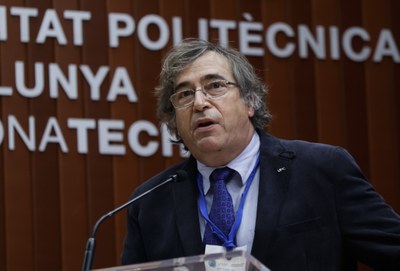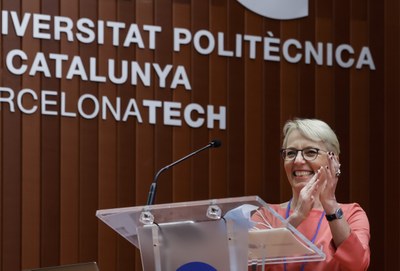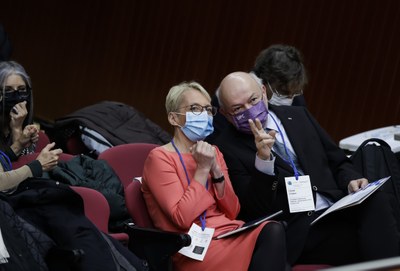The commitment to European education, technology and entrepreneurship moves forward with Unite! alliance
Audience at one of the sessions in the 4th edition of Unite! Dialogue in Barcelona at the Unite! community session, “Everything you always wanted to know about Unite! but never dared to ask”.
What is the future of the Unite! alliance? What steps must the universities in the alliance take to lead the transformation of European higher education in the coming years? How must they move towards a new model of innovative and multidisciplinary education, ethical, safe and sustainable research and entrepreneurship in co-creation by students and academic staff?
Dec 21, 2021
For three days, representatives of the seven universities that form part of the Unite! alliance met in Barcelona at an event hosted by the Universitat Politècnica de Catalunya · BarcelonaTech (UPC) to discuss these issues at the IV Unite! Dialogue, Past, Present and Future.
More than 200 people participated in the meeting in person and 150 more did so virtually from all the universities in the alliance (23 from Aalto University; 41 from Grenoble INP; 26 from the Royal Institute of Technology, KTH; 43 from the Politecnico di Torino; 39 from the Technical University of Darmstadt; 34 from the Universidade de Lisboa; and 123 from the UPC, including students and staff). Twenty rectors and vice-rectors and 35 speakers from the business and political spheres also participated in the debates and meetings.
In the plenary sessions and working group meetings (more than 40 official meetings), the alliance was able to review the results obtained so far from the different initiatives that have been launched under the umbrella of the European projects Erasmus+ and H2020. Progress was made on reaching a consensus on the new challenges that lie ahead, reviewing its mission and establishing its governing bodies.
Unite! remains committed to fostering science, technology and engineering education on a multidisciplinary, multicultural and multilingual European campus, integrated in active entrepreneurial ecosystems, to generate innovations with a strong social impact across Europe and the world. Participants have confirmed, during the different sessions and discussions, their commitment to an ethical, safe and sustainable use of technology, that is in line with a fair and open science aimed at empowering and training a new generation of European and global citizens. Some issues are still pending, such as the recognition of qualifications between educational systems in the different countries, which will pave the way for designing future European engineering and architecture qualifications.
As the secretary of Unite! Andreas Winkler says“the main objective of this fourth meeting of the alliance has been to jointly define our future and give a new direction to what is to come and how Unite! wants to continue to grow”. For the secretary, the meeting has shown, after two years of work, “the lively cooperation between all the university communities that are part of it”.
The meeting hosted the first meeting of SURE, Students for Representation and Empowerment, the alliance’s student representation body.
The Unite! Governing Platform, which brings together the rectors of the universities, took a number of important governance decisions during the meeting that lay the foundations for further structural and sustainable cooperation. In this regard, the first meeting of the Unite! Academic Forum took place, a governance body that brings together academic and administrative staff and students from each university and whose mission is to advise the Unite! Governing Platform on the development of the alliance and to monitor the progress of the alliance’s work. In addition, the Governing Platform adopted the Unite! Quality Management Manual. Its approach can be considered a role model and an example of good practice for higher education institutions in Europe.
The Unite! Governing Platform also intensively discussed a possible extension of the partnership. Just one week after the Unite! Dialogue meetings, the alliance has announced two new partners: Graz University of Technology, in Styria, Austria, and Wroclaw University of Science and Technology, in Poland. This expansion ensures the presence and representation of all European geographical regions in the alliance.
As Juan Jesús Pérez, key liaison officer at the UPC, the meeting’s host, stated, “the 4th Unite! Dialogue has been a splendid opportunity to reflect and review achievements, analyse the degree of fulfilment of objectives and brainstorm on the future of the alliance. There were interesting discussions on the current state and future of the alliance, but what was most important was the personal satisfaction of seeing delegates from the various working groups delighted to meet in person with renewed enthusiasm, surpassing the resilience demonstrated during the pandemic.”
Unite! members continue to work on the alliance’s projects, which will be reviewed and discussed next March at the 5th Unite! Dialogue at the Royal Institute of Technology (KTH) in Stockholm.
As Tanja Brühl, president of the alliance and rector of the Technical University of Darmstadt, said at the opening of the 4th Dialogue in Barcelona: “We started as pioneers committed to the goal of transforming European higher education and our mission statement illustrates that we are committed to innovation, multidisciplinarity, teaching, research and entrepreneurship.”
Tanja Brühl, President of the Alliance and Rector of the Technical University of Darmstadt, at the opening of the 4th Dialogue in Barcelona.






